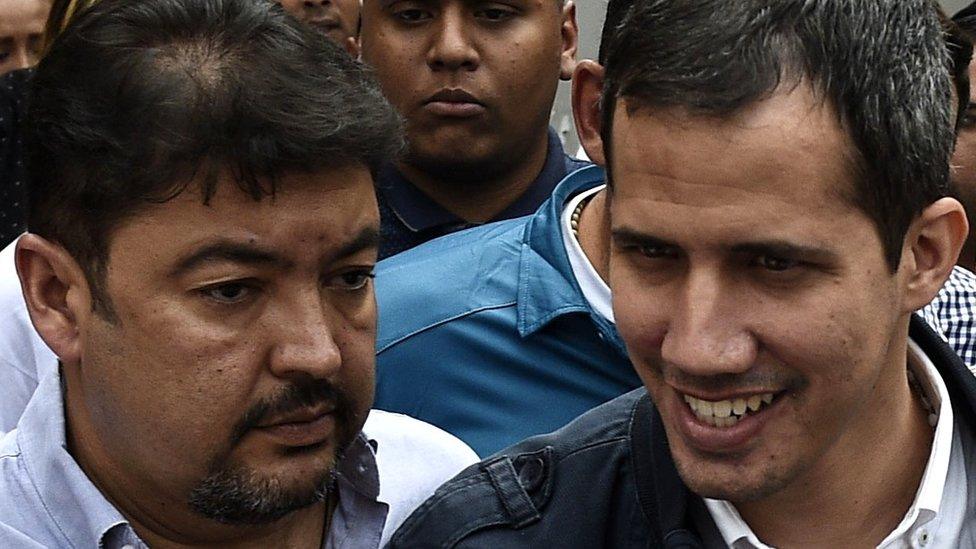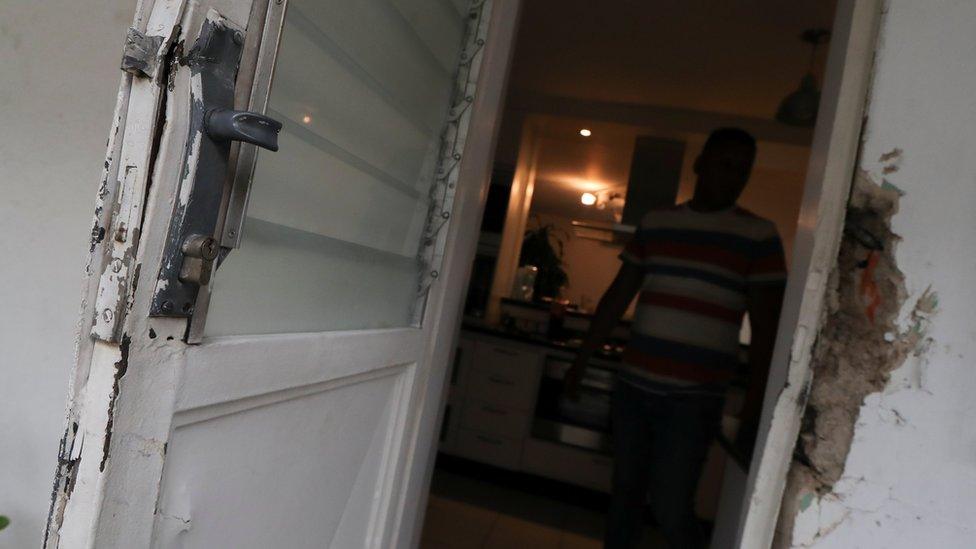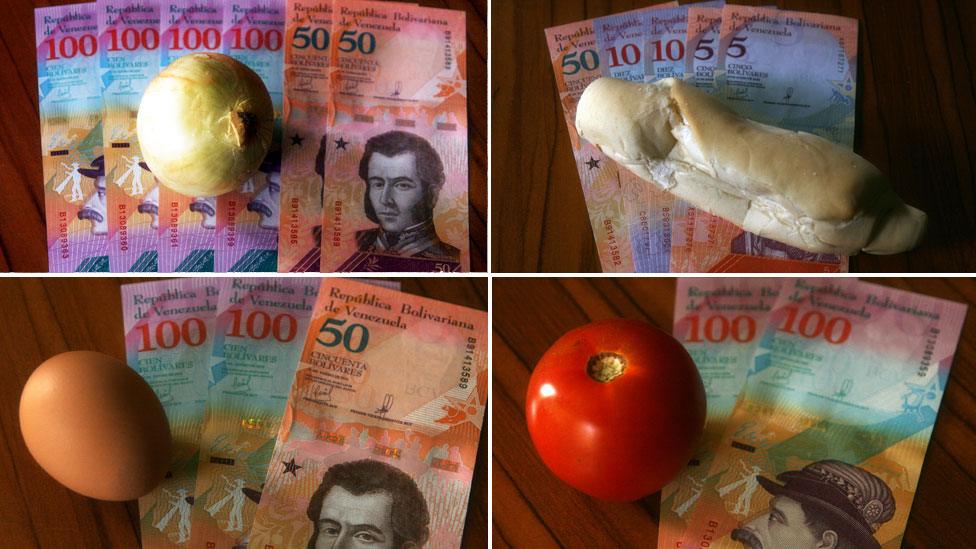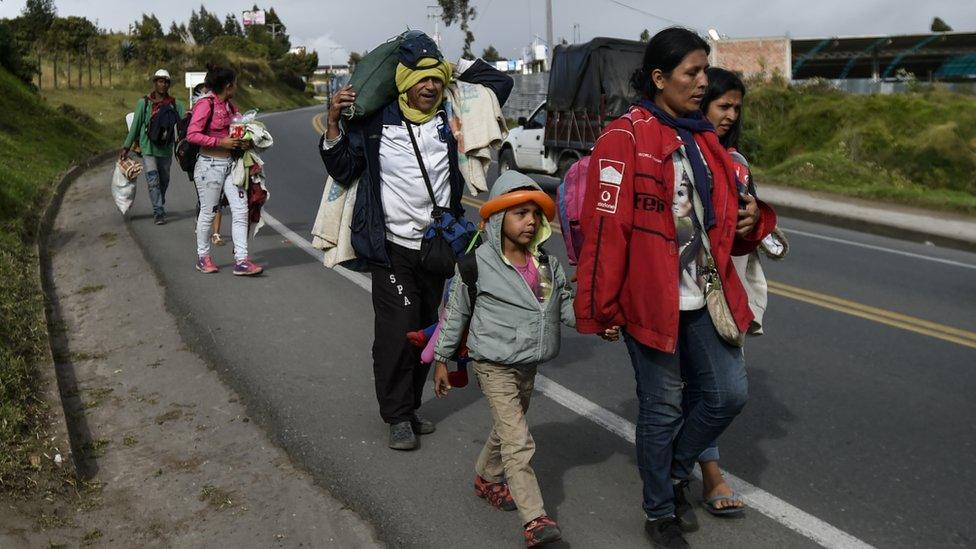Venezuela crisis: Guaidó aide faces terrorism charges
- Published

Juan Guaidó (R) at a rally with his chief of staff Roberto Marrero earlier this month
A top aide to Venezuelan opposition leader Juan Guaidó is being charged with terrorism after he was arrested by President Nicolas Maduro's government.
Mr Guaidó's chief of staff Roberto Marrero, 49, is accused of planning "acts of sabotage" against officials.
Venezuela's Interior Minister Nestor Reverol said that "weapons and foreign currency" were found by intelligence services during a raid on his home.
Mr Guaidó has called for Mr Marrero's immediate release.
He said that the security forces had committed an "illegal and unconstitutional" act, adding that he believed the items allegedly found at Mr Marrero's home had been planted there.
Mr Guaidó has described his aide's detention as a "vile, vulgar kidnapping".
Mr Marrero was arrested as part of an operation to dismantle a "terrorist cell" allegedly planning attacks on the government, Mr Reverol said.
His bodyguard, Luis Paez, faces similar charges.
Mr Guaidó, head of the opposition-controlled National Assembly, declared himself interim leader on 23 January, saying Mr Maduro's re-election last May was illegitimate.
At a press conference on Thursday, he said Mr Marrero's arrest "won't make us deviate from the path we are on" and asked Venezuelans to "stay united and mobilised".
With the backing of the Trump administration, Mr Guaidó has been leading calls for Mr Maduro to stand down as president as discontent with his socialist regime grows.
Mr Marrero's arrest has provoked international condemnation, with the US, the European Union and Latin American nations all demanding his immediate release.
He is Mr Guaidó's main political adviser and his detention is likely to raise tensions both within Venezuela and internationally, the BBC's Will Grant in Caracas reports.
How has the US reacted?
US Secretary of State Mike Pompeo, external and National Security Advisor John Bolton were among those to denounce Mr Marrero's pre-dawn arrest at his Caracas home.
On Thursday, Mr Bolton tweeted: "Maduro has made another big mistake. The illegitimate arrest of Roberto Marrero, Interim President Juan Guaidó's aide, will not go unanswered. He should be released immediately and his safety guaranteed."
President Trump this week said "all options" are being considered in relation to the situation in Venezuela, alluding to the possibility of military action.
On Friday, the US imposed sanctions on the Venezuelan economic development bank Bandes.
US Treasury Secretary Steven Mnuchin said Mr Maduro and his enablers had distorted the original purpose of the bank in a desperate attempt to hold onto power.
"The regime's continued use of kidnapping, torture, and murder of Venezuelan citizens will not be tolerated by the US or the international coalition that is united behind President Guaido," he said, before calling for Mr Marrero's immediate release.

Mr Marrero's residence was thoroughly searched by intelligence officers

Damage at Mr Marrero's residence in Caracas
What's the background?
Mr Guaidó and Mr Maduro each claim to be the constitutional president of Venezuela.
Shortly after Mr Guaidó declared himself interim leader, his assets were frozen and the Supreme Court, dominated by government loyalists, placed a travel ban on him.
Juan Guaidó speaking to the BBC last week: "We want genuinely free elections"
But the 35-year-old opposition leader defied that ban last month when he toured Latin American countries to garner support.
Mr Guaidó has continued to call for President Maduro to step aside and urge the security forces, which have mainly been loyal to the government, to switch sides.
Last week, the chief prosecutor said it had asked the Supreme Court to investigate Mr Guaidó for allegedly sabotaging the country's electrical system in the wake of this month's power cuts.
Mr Guaidó has been recognised as leader by more than 50 countries, including most in Latin America and the US. Mr Maduro, who still has the support of China and Russia, accuses the opposition of being part of a US-orchestrated coup.
- Published4 February 2019

- Published30 December 2018
